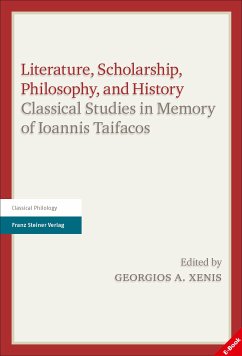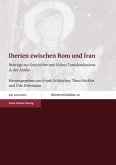The eleven papers of Part I deal with Greek and Latin literature: epic poetry, Polybius, Lucian, Tatian, Gregory of Nazianzus, the reception of Greek epigram in nineteenth-century Greece; Cicero, Caesar, Atellane Comedy, Ovid, and the bilingual poetry of Late Antiquity. Part II features five papers on Greek and Latin scholarship, and three on papyrological, rhetorical and linguistic topics: Valerius Probus, Priscian, John of Alexandria (Aelius Herodian), the Greek Etymologica, 'prototypon/absolutum' in Latin grammatical terminology; the papyrus rolls of the Aristotelian Constitution of Athens and Herodas' Mimiambs; George of Trebizond; a graecism in Latin syntax. Part III, made up of seven papers, is devoted to Anaximander, Plato, Aristotle, Clearchus, Stoics, Cynics, Galen, and Nicolaus Cusanus. Finally, Part IV contains a paper on the Arabian policy of Trajan.
Dieser Download kann aus rechtlichen Gründen nur mit Rechnungsadresse in A, B, BG, CY, CZ, D, DK, EW, E, FIN, F, GR, HR, H, IRL, I, LT, L, LR, M, NL, PL, P, R, S, SLO, SK ausgeliefert werden.









